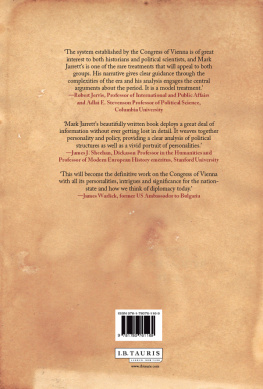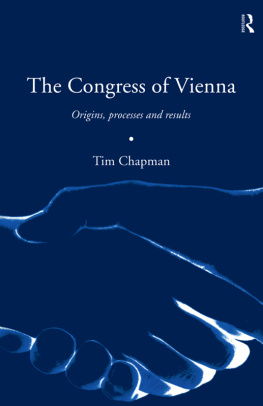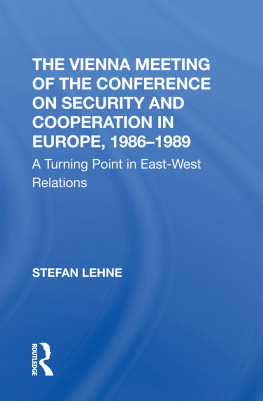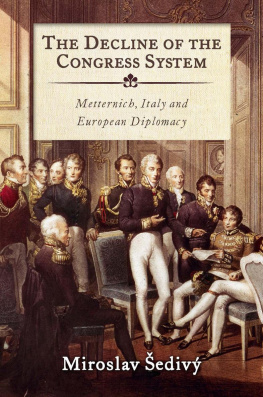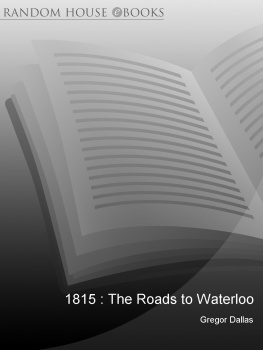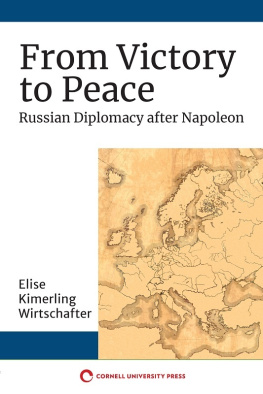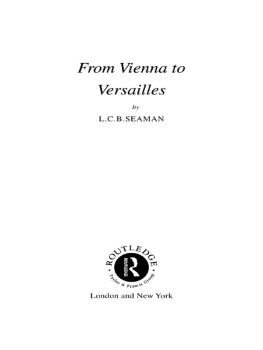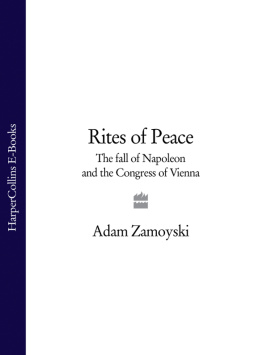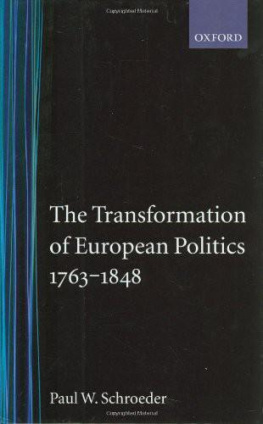Mark Jarrett holds an MA in International History from the London School of Economics, a PhD in History from Stanford, and a Law degree from the University of California, Berkeley. He has taught at Hofstra and Stanford and has worked as an attorney at the worlds largest international law firm.
The system established by the Congress of Vienna is of great interest to both historians and political scientists, and Mark Jarretts is one of the rare treatments that will appeal to both groups. His narrative gives a clear guidance through the complexities of the era and his analysis engages the central arguments about the period. It is a model treatment.
Robert Jervis, Professor of International and Public Affairs and
Adlai E. Stevenson Professor of Political Science, Columbia University
This book is more than a comprehensive and richly detailed account of the complex diplomatic and international relations in post-Napoleonic Europe, which will undoubtedly become a standard reference in the curricula of university students. It is, more importantly, a fascinating journey through the Europe of early the nineteenth century, from Sicily to Russia, from England to the Balkans. Whereas other historians mostly focus on the great powers that defeated Napoleon in 1815 (England, Prussia, Austria and Russia), Mark Jarrett avidly researched and brilliantly presents the diverse constellation of diplomatic interests and political movements that contributed to reshaping the European system.
Breaking free from the ideological prejudices still prevalent in the field (whether international, national, or post-colonial), Jarrett boldly assumes a broader perspective, where characters are seen as actors playing their respective roles within a bigger game of War and Peace: the Congress System. His is therefore not the ordinary Manichean account of heroes or villains, victories or defeatsexcept in the minds of the characters themselves, which he depicts in a compassionate manner, regardless of the sides they happened to take.
He does so with an impressive display of scholarship; he is among the first English-speaking authors to take the measure of southeastern Europe and Russia in that crucial periodan accomplishment that has been long awaited. Under his pen, the Eastern Question (the ongoing division of the Ottoman Empire) and the independence of Greece are not presented as a mere chess game between ministries of colonial powers for land and commerce; it is also a story of real people, involved in a game of life and death.
In short, The Congress of Vienna and its Legacy successfully combines well-balanced historical research with fresh and vivid history-telling in the best sense of the word, truly enjoyable for all kinds of readers. This is one of the most comprehensively documented and captivating books on the history of the Congress System published in years.
Stella Ghervas, Institut dtudes avances, Paris, and author of Rinventer la
tradition. Alexandre Stourdza et lEurope de la Sainte
Alliance (winner of the Guizot Prize of the Acadmie Franaise, 2009)
Mark Jarretts beautifully written book deploys a great deal of information without ever getting lost in detail. It weaves together personality and policy, providing a clear analysis of political structures as well as a vivid portrait of personalities.
James J. Sheehan, Dickason Professor in the Humanities and Professor of
Modern European History emeritus, Stanford University
This will become the definitive work on the Congress of Vienna with all its personalities, intrigues and significance for the nation-state and how we think of diplomacy today. As someone who recently had responsibility for US policy at the UN and other international organizations, the challenges of multilateral diplomacy continue, only with more actors and problems of global scope. I wonder how a Castlereagh or Metternich would deal with the frustrations and intransigence we see in the UN Security Council. Or whether such persons could even emerge. Its interesting that the Congress of Vienna still holds value for a new kind of diplomacy that has taken shape. Traditional multilateral organizations are often unable to address our greatest challenges, and what is emerging is a system of variable geometry where organizations, countries or individuals come together informally to develop a common approach. Look at the emergence of the G-20 in the financial crisis, the six-party talks for the DPRK, or 6+1 on Iran. And there are many more examples. These are no longer conferences or traditional bilateral diplomacy but are coalitions that form usually among the like-minded for a limited purpose and period. The Congress of Vienna seems to be a forerunner of this modern model, whether to contain France or put in place a system for addressing future issues. I can understand the common view that the Congress of Vienna was the model for how nation-states would conduct modern diplomacy. Im sure this book will become a required read at the State Departments Foreign Service Institute, whether in our classes in negotiations or on leadership.
James Warlick, former US Ambassador to Bulgaria
Mastering all the relevant primary sources as well as the secondary literature, encompassing all the latest research and analyses of international historians as well as the theories of international relations specialists, Mark Jarrett illuminates a vital two decades in European history that have long been neglected. His is indeed a wonderful bookclearly written, extremely well-researched, open to a whole variety of explanations from historians and political scientists, well balanced, fair in its judgements of historical characters and contemporary academic opinion, and seminal in its allusions to present-day events. I have little doubt that this book will become the standard work on the Congress System.
Alan Sked, Professor of International History, London School of Economics
and Political Science, from the Foreword to this book

Published in 2013 by I.B.Tauris & Co. Ltd
6 Salem Road, London W2 4BU
175 Fifth Avenue, New York NY 10010
www.ibtauris.com
Distributed in the United States and Canada Exclusively by Palgrave Macmillan
175 Fifth Avenue, New York NY 10010
Copyright 2013 Mark Jarrett
The right of Mark Jarrett to be identified as the author of this work has been asserted by the author in accordance with the Copyright, Designs and Patents Act 1988.
All rights reserved. Except for brief quotations in a review, this book, or any part thereof, may not be reproduced, stored in or introduced into a retrieval system, or transmitted, in any form or by any means, electronic, mechanical, photocopying, recording or otherwise, without the prior written permission of the publisher.
ISBN: 978 1 78076 116 9
eISBN: 978 0 85773 570 6
A full CIP record for this book is available from the British Library
A full CIP record is available from the Library of Congress
Library of Congress Catalog Card Number: available
CONTENTS
LIST OF PLATES
LIST OF MAPS
To my parents, Beverly and Paul, for their love and patience.
To my children, Alexander and Julia, for the joy they have given me.
To the memory of those of my teachers who did not live to see this
publication: Gordon A. Craig, Alexander L. George, Kenneth Bourne,
Marc Raeff, J.M.W. Bean, Matthew S. Anderson and John Dinwiddy.
And finally, to my wife, Magorzata, who grew up in Puawy in the shadow of
the Czartoryski Palace, where Tsar Alexander met the Polish nobility on his
journey to the Congress of Vienna almost exactly two centuries ago.
Next page
